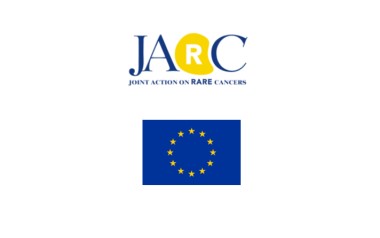JARC - Joint Action on Rare Cancers
Project ID
724161 - HP-ADHOC-2014-2020-JA-2015
Project title
Joint Action on Rare Cancers
Project manager, contact details
Krisztián Tóth, toth.krisztian@pte.hu
Academic supervisor, contact details
Béla Melegh, dr., bela.melegh@.aok.pte.hu
Total project budget
1.499.848. EUR
Total budget of UP
88.275. EUR
Project start date
Project end date
Coordinator
Fondazione IRCCS Instituto Nazionale dei Tumori (IT)

Partner Organisations
Ethniko Kai Kapodistriako Panepistimio Athinon (GR), Organisation of European Cancer Institutes (BE), Institut Scientifique de Sante Publique (BE), Siop Europe ASBL (BE), Institut Catala ’Oncologia (ES), Suomen Syopayhdistys Cancerforeningen I Finland RY – Cancer Society of Finland CSF (FI), Hrvatski zavod za javno zdravstvo – Croatian Institute of Public Health (HR), Escuela Andaluza de Salud Publica SA (ES), EURORDIS – European Organisation for Rare Diseases Association (FR), Fundacion para la Formacion e Investigacion Sanitarias de la Region de Murcia (ES), Institut National du Cancer (FR), Institut National de la Sante et de la Recherche Medicale (FR), National Cancer Registry Board (IE), Szegedi Tudományegyetem (HU), Országos Onkológiai Intézet (HU),Universitat de Valencia (ES),Viesoji Istaiga Vilniaus Universiteto Ligonines Santariskiu Klinikos (LT), Fundacio Hospital Universitari Vall d’Hebron – Institut de Recerca (ES), Ministerstvo zdravotnictvi Ceske republiky (CZ), Aristotelio Panepistimio Thessalonikis (GR), Fundacion para el Fomento de la Investigacion Sanitaria y Biomedica Dela Comunitat Valenciana (ES), GPOH Gemeinnutzige GmbH (DE), Ministero della salute (IT), Universitatea Babes Bolyai (RO), Ministry of Health of the Republic of Cyprus (CY), Health Service Executive HSE (IE), Lietuvos Sveikatos Mokslu Universiteto Ligonine Kauno Klinikos (LT), The Ministry of Health of the Republic of Poland (PL), Pancare(NL), Ministry of Health – Government of Malta (MT), Deutsche Krebsgesellshaft e.V. (DE), Oslo universitetssykehus HF (NO), Pécsi Tudományegyetem (HU)
General description
The Joint Action on Rare Cancers (JARC) is aimed to integrate and maximize efforts of the European Union (EU) Commission, EU Member States and all stakeholders to advance quality of care and research on rare cancers.
The public health challenge posed by rare cancers combines both the typical problems of rare diseases (such as the limited professional expertise available in the community, or the difficulties in clinical research) and those of cancer, with the need of a timely and appropriate diagnosis and optimal treatment from the very beginning of the patient’s journey. An accurate clinical, pathologic and biological assessment of the disease of the individual patient is key to survival and cure, as well as an expert clinical decision provided by a multidisciplinary team. To this end, proper referral of patients and effective clinical networking are crucial in rare cancers. This is the main reason why JARC decided to shape its efforts, in essence, around the new European Reference Networks (ERNs). European Reference Networks, three of which are specifically devoted to rare cancers, have been conceived by the EU Commission as a means to provide “highly specialised healthcare for rare or low-prevalence complex diseases”. The formal activation of ERNs is a cornerstone in the EU cooperation on rare cancers, and this Joint Action should be instrumental to make them grow up the best way possible. In fact, JARC aims at optimizing the process of creation of the ERNs, by providing them with operational solutions and professional guidance in the areas of quality of care, epidemiology, research and innovation, education and state of the art definition on prevention, diagnosis and treatment of rare cancers.
Program
Horizon 2020
Application monitoring
Link
